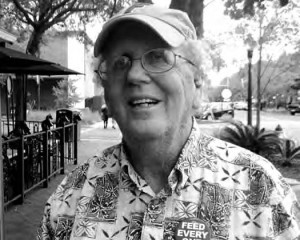 by Katie Walters
by Katie Walters
Surrounded by close friends and family, Pat Fitzpatrick passed away on August 3, 2015, at the Malcolm Randall VA Medical Center after a long bout with liver disease. He was 65 years old. He will be celebrated by his two children, Dan and Katie, his two sisters Katherine and Nora, and many close friends.
Pat was a lifetime agitator and advocate for the poor and underrepresented. As his bandmate and friend Jon Decarmine expressed, “He was an incredible guy with a huge heart and a knack for making social justice work absurd and hilarious.”
A co-founder of Home Van (a mobile soup-kitchen and free store), he lived as a secular Franciscan — Catholic laypeople who live poor and work with the poor. Pat did what many talk about, or deem theoretically important, he “went to the people.”
Pat and his signs demanding the city “Feed Everyone” were regular fixtures at city commission meetings. He had no patience when peoples’ needs were being ignored — seen by his frequent outbursts at city commission meetings, which often got him thrown out. Despite his true and deep anger toward the injustice of the world, at the heart of that was love and respect for people.
Pat was born in Deland, Florida, in 1949. He joined the Air Force and after getting out in 1974, got his bachelor’s degree in history from UCF. He then joined Vista (AmeriCorps Volunteers In Service To America) and was sent down to the Everglades area to work with farmworkers. This experience shaped his life.
As Pat recounted, “We can go without seeing poverty all our lives because of the segregation of the rich and the poor in this country. I got down and saw this deal with the migrant farm workers. I saw how little they paid them, how hard they worked, and then they had company stores that they went to… I saw the situation, and it’s horrifying. I call it brutal poverty.”
During his time with Vista, Pat worked in Immokalee, Clewiston, Morehaven, and all around Lake Okeechobee. Pat eventually became a contract administrator with the United Farm Workers. After years of working with cases of slavery and abuse with migrant farmworkers, he went to UF to get a master’s degree in rehabilitation counseling.
He returned to the Everglades area to work with Florida Coalition against Hunger. He then got a master’s degree in social work from FSU. Pat explained he “got a degree in social work to see how the system worked.” He moved to Gainesville again in the 1990s, desiring his children to grow up in a progressive area, and worked as a drug counselor in a prison for 11 years, until the prison drug abuse program was privatized and many were laid off.
His friend and ex-wife Karen Epple remembers, “I met Pat at the AFDC/ Food Stamp office where I worked, in Immokalee, FL. He was working with recent immigrants and hanging out with his farmworker union friends. I was inspired by his passion for the downtrodden and forgotten people in the world and his outrage towards the people who exploit them. Pat always gravitated to the social justice radicals in any setting, and got arrested in Tallahassee, for sitting in at Rep Don Fuqua’s office protesting aid to the Nicaraguan Contras. He was also arrested in Gainesville during that time, for protesting the death penalty when Justice Renquist was speaking at UF. Pat has been strongly opposed to the death penalty, as long as I knew him, another form of brutal injustice against the poor and minorities. We have been friends for 33 years, were married for 11 years. I joke that he was a better friend than a husband, but he always loved his children and was a good father, and we both agreed that they were the best thing we did together.”
The documentary film “Civil Indigent” follows Pat’s fight against the meal limit placed on the St. Francis House in downtown Gainesville (the limit was removed in 2011). The film describes his three runs for city commission, with his son Dan at his side as his campaign treasurer, as one way he called attention to and demanded action on issues that affect the homeless community.
In 2012 he was awarded the MLK Hall of Fame Award for this work. In 2013 he received a Lifetime Achievement Award for his work with the homeless. In 2000 he received a Recognition Award for his dedicated work with tobacco use prevention and cessation. He continued his efforts to help the homeless and to provide tobacco cessation counseling just prior to his death.
Pat didn’t take no for an answer, and often referred with a smile to a grade school report card that stated he “talks too much and disturbs others.” This was engraved on his grave marker, as he had requested. He was buried in a green burial at the Prairie Creek Conservation Cemetery, where a memorial celebration of life was held. Many friends and family members gathered to share stories and play music in honor of Pat. His effect on our community will live on in the hearts and work of all whom he touched, pushed, and inspired.
